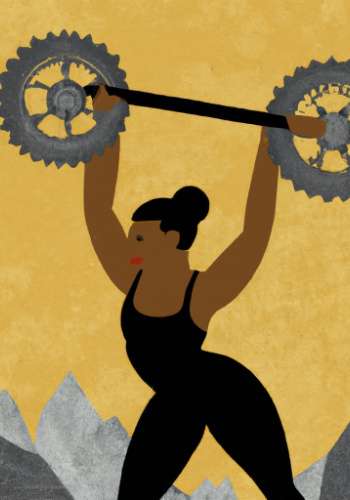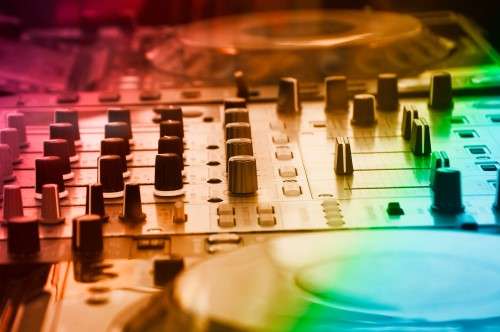Let’s talk about two ways to increase your motivation and focus when doing music, and in life. And I’ll introduce a third technique to cover later. If you want to increase your motivation, or if you have a pile of unfinished songs, read on.
Background
For the past 10-12 years I’ve worked in highly focused spurts of 6 weeks to 6 months, but then I tend to lose motivation. I’ve built businesses in the bursts of energy. I’ve completed music projects, too. But more often than not, I abandon a song, a product, or a lyric halfway through.
When I got near completion for a project, my killer instinct was gone. I couldn’t get it over the finish line. Leaving some things unfinished is normal, but it got to the point where sometimes I could only handle one task in a day.
Sound familiar?
It took me a while to realize what was going on. In my down periods. I’d get up every day with a plan, and at the end of the day, I’d rarely made any progress. I began to think I was just lazy.
Eventually, every aspect of my life suffered. My business decreased about 80% over 5 years. Relationships suffered. My health started to go downhill. I wasn’t writing or finishing many songs.
Recently, I came across some information that I think will be a big help in undoing this downward slide. And so far, it’s working well.
Where to start? Leverage
A few months ago, when I was looking to crawl out of this hole, I knew I had to approach recovery with leverage. A leveraged activity is an activity that helps you across a wide swath, instead of in one area only.

For example, in music, with guitar playing, if I work on my picking speed, it gives me improvement in picking speed and maybe a couple of closely related areas. It’s not leveraged.
Leveraged activities in music might be ear training, arrangement skills, songwriting skills, and production skills. Improvement in any of these areas will help across a wide range of activities. What’s likely to help more — writing better songs, or having a faster picking speed?
Sometimes you need to drill down and work on specific skills. But if I could only handle one task to start, I needed it to be something that improves me in lot of areas at once.
Leverage In Life Activities
In life, two great places to look for leverage are diet and exercise. They both have benefits in many areas. A better diet gives you more energy across the board. Exercise does as well, and it’s a powerful anti-depressant.
So, I decided to start there. (I’ll bring this back around and apply it to music later in the article, I promise).
I didn’t go extreme with my diet. I just added a couple healthier meals. I usually order delivery, so it was easy. Your situation may be different.
My goal was to eat at least one, and maybe two healthier meals a day. This isn’t diet advice, and I’m not a dietician, so I’m not going to suggest what to do beyond looking at what you eat, and consulting professionals, if your energy is low.
Other than that, I decided that if I’m only able to do one thing a day, exercise should be it. So, about 4 months ago, I started regular exercise. The first time I got up on an elliptical, and after 8 minutes, I was ready to throw-up. A couple of years of mostly sitting around waiting for the pandemic to end didn’t do me a lot of good.
Now, after a few months, I can do 30 minutes on a treadmill at a moderate level, with no problem.
If you’re thinking about exercise, at this phase, I think it’s less important that you pick exactly the right exercise program, and more important that you simply do something.
I’d start with the most convenient and enjoyable thing you can do. Maybe walking 20 minutes.
Consult A Health Pro Before Starting An Exercise Program 🙂
I’m discovering, as I read more, that I should probably replace some of my cardio with weights. Cool. I can tweak it as I learn. The point is to get in the habit.
Exercise Means Better Sleep, More Energy, And More Ability To Focus
Some days, when I started, the exercise was all I could do for the day. But I’m finding that more and more often, I’m able to do two or three fairly reasonably-sized tasks in a day. Maybe exercise, vocal practice, and make progress on a song I’m recording. Good!
The point is, look for leverage. Maybe you already have your diet and exercise handled. What is it you can do that will improve you in multiple areas, or across a wide swath?
And what about music improvement? Music theory? A recording course? Getting better at songwriting will make recordings sound better, and marketing easier.
Look for leverage, and start there.
One of the biggest places for leverage is dopamine.
Dopamine Timing & Motivation
Motivation is key. If you have more motivational energy, you’ll get more of everything done.

But here’s the kicker, and the thing I’m pretty excited about right now. I was listening to Andrew Huberman talk about dopamine. Huberman is a neuroscientist and tenured Professor of Neurobiology at Stanford. According to Huberman, and everyone else, dopamine levels are responsible, in large part, for our motivational level.
Dopamine is a hormone and neurotransmitter our body makes. It helps us feel pleasure, motivation and mental focus. If your dopamine is not managed well, you won’t do what you need to do. And I’ve been doing it all wrong.
You see, dopamine gets associated with certain activities in a stimulus response pairing — like Pavlov’s dogs. According to Huberman, you should associate dopamine release with high effort activities.
Why?
Look at how addiction works. At first, you get a nice dopamine rush from the addictive activity or substance. Then, you need more and more to get the same ‘high’. We want that drive pointed at effort and focus, rather than social media and laying on the couch.
If we can attach dopamine release to healthy activities and motivation, we can get a lot more done, with a lot more fun!
Optimize Dopamine Release Timing
So, how do you optimize your dopamine response? Well, I looked at two pretty easy ways to do it.
Previously, when I’d been on the treadmill running a preconfigured program, I would dread the higher speeds and feel a lot of relief when I hit the easier stretches. I would look forward to the slow parts, and I would have positive self-talk about finishing the tougher parts.
Well, that ain’t the way to do it!
If you think about it, I was pairing dopamine release to easing up. I was literally training my brain to crave less effort.
I watched a video cut of Tom Cruise. In it, he talked about loving challenges and hard work. He said he works 7 days/week. A movie set is like a vacation to him. I don’t want to be like that. But I want to be more like that than I am now:-)
How do you get more motivated and loving a challenge? Well, instead of being ‘addicted’ to the easy parts, you get ‘addicted’ to the hard parts. I simply switched the timing of my self-talk and imagery while I was on the treadmill.
During the hardest parts of exercising, I said to myself (you might think this is funny), “You’re doing the thing!” And I visualized myself with more energy and vitality as I said it. Boom!
A funny thing happened.
On the first day I followed this idea, after a couple of times giving myself positive feedback during the ‘difficult’ parts, the treadmill speed went up, when I thought it was going to go down. On this particular treadmill program, the speed goes up and down automatically. It changes every 30 seconds.
Previously, when the speed had increased, I’d felt dread and steeled myself to tough it out. But this time, my immediate, and (to me) completely surprising reaction was “Bring it on motherfucker!” Was that my killer instinct coming back? We’ll see.
So that’s step one to optimizing your dopamine/motivation/focus. Simply give yourself a mental pat on the back during the most effortful and challenging tasks. The positive self-talk and imagery gives you a nice dopamine hit. Consistently associate that with high effort tasks, and you’ll have more motivation for them.
Your Job When Working On Music

I think it’s important at these specific times to remember what your job is when you’re practicing music, and making progress with writing or recording. Your job is to bring focus to the table. Your job is to work it. Your job isn’t to be perfect.
So, if you’re focusing as much as you can, and you’re being challenged, congratulate yourself for that, even if the challenge is getting the best of you at the moment.
“Man, I am here, and I’ve got my shoulder to this thing. That’s what I’m supposed to do. Yeah!” And picture yourself getting some outcome you want from whatever you’re working on.
It’s important to give yourself believable (to you) positive feedback. If you say to yourself that you’re the world’s greatest violinist, and it’s not true, you may trigger a negative feeling and negative internal dialog, and imagery. This isn’t the time. So give yourself something you can feel good about.
At the most basic level, you are making an effort. As I said to myself on the treadmill, “I’m doing the thing!” By that, I meant I was doing something good for myself. I could feel good about that. Give yourself positive feedback you can feel good about.
Do this regularly. Give yourself positive feedback during high effort musical tasks, and you’ll train your brain to crave challenge, and do well with it.
Maximizing the dopamine connection
The first order of business is to get dopamine associated with your high-effort, high-focus musical tasks. Let’s say writing lyrics is your biggest challenge. When you sit down to write lyrics, and you get to the hardest part, give yourself a bit of positivity. At first, do this every time you get to a significant effort.
But the strongest reinforcement is random. So, after you have the pattern established, reward yourself with positive self-talk and imagery sometimes, but not every time.
When you finish a task, don’t reward yourself. Keep the rewards in the high-effort zone.
Don’t worry if you make a mistake. It takes a while to get this habit ingrained. Just move on and do it right next time.
Now, phase two of the dopamine wars.
Social Media Addiction

Social media is designed to get you addicted to, guess what? Social media. I found myself reaching for my phone 50 times a day, 100 times a day.
Your know how it is. You go to see if your post got likes, or someone posted something you agree with politically. You get a little dopamine hit from that, or posting your snarky reply to someone you disagree with.
Then you brain starts to crave it. Your body can’t produce unlimited dopamine. And after the ‘high’, you need recovery time. If you use up your dopamine supply on social media, you’ll have to spend recovery time afterward. Guess what? You’ve just blown your day.
Breaking The Addiction
So, how do you decouple that conditioned response to social media?
Well, I’ve tried a few things. I’ve told myself I’ll limit my time on social media. I tried turning my screen monochrome. I’ve made up my mind not to check Facebook when I first get up. It didn’t work. I had a problem, and it was sucking my motivation levels dry.
But here’s what I started a couple of weeks ago, and it’s going well, so far. It’s a two-pronged attack.
First, I’ve made a commitment to myself — not to stop looking at social media — but just to delay it. When I have the urge to look at my phone, I count to 30.
This helps separate the stimulus from the response. In this case, the urge is usually created by a subconscious thought, that I might be missing out on some news, or that there might be something fun to look at.
I’m craving it. That means my body is flooded with the biochemicals of craving.
30 seconds later, my body has mostly recovered, and I have (one time) distanced the action from the thought. I find that after just a short time, my social media usage is down about 80%, and my cravings are less frequent.
Generally, during that 30 seconds, I think about how I feel, and what I really want. I usually feel some anxiety that I’m missing out on something. I take a deep breath and let it go. After that, I think about what I really want. Mostly, I want to do something more meaningful to me. Sometimes, I just want to chill, or have fun, or check on a friend. That’s OK. If I want to chill, I chill. If I want to do something more productive, I do.
Now, instead of social media, I’m getting more of my dopamine fix from things that move my music, business and health forward. I’m much more highly optimized for motivation and focus toward productive tasks.
Let’s see how it goes.
What Happens If You Don’t Even Have The Energy To Get Started
My story is different than yours. I had been rewarding myself at the end of tasks, and giving myself positive self-talk and imagery in the wrong timing, for years. Maybe you don’t have that hurdle to overcome.
Maybe you have health challenges, or lots of stress at work or with family.

Too much of the wrong kind of stress depletes our energy. Dopamine, once expended, needs to be replaced. We need down time, and relaxation. Maybe you don’t have that luxury. Numerous factors could make it difficult for you to get started.
Let me lay out what has worked for me, and my thoughts about what to do if you can’t get started.
- If you have health problems, poor diet, and don’t exercise, start by doing what you can with those issues. If you can’t walk, breathing exercises can help you with your energy levels (check with your doctor). Do what you can.
- It’s not generally recommended to stack dopamine producing activities. In other words, don’t listen to your favorite music when you do your effortful tasks, if you want to maximize your motivation for those tasks. Don’t eat chocolate, either. However, if you can’t even get started, ignore that guideline. Give yourself a little sumpin’ sumpin’ as a bribe to get going. Then focus on the mental reward system during effortful times. Eventually, you’ll find yourself more motivated to do the thing, without the bribe.
- Break the start of whatever task you’re meaning to do, down into the a 30 second or less task. If you want to write lyrics every day, the first step might be something as easy as picking up a pencil. Want to practice piano? The first step is sitting down at the bench and opening the piano. Or maybe it’s getting into the car to drive to the rehearsal space. Commit to doing that task. Many times, thinking about an entire task can be overwhelming, and the hardest part is starting. But once you start, you’re likely to follow through.
- Remove any obstacles you can, to doing the task. It can be small things that overwhelm us. Can you have your classical guitar out of the case, your music, music stand, footstool and chair set up and ready to play when you wake up? Can you tell the kids in advance that mommy is going to be busy from 8AM-9AM, and they better not interrupt unless someone’s missing a limb? Can you have your instrument prepared, your space ready, your software open, so that all you need to do is sit down and start? Can you have pen and paper ready in your writing space so you can start writing when it’s time? Do that.
Life isn’t perfect, neat, and tidy. Maybe you can’t leave your writing pad out on the desk because the dog will eat it. Or maybe you don’t have a desk. Maybe your kids won’t leave you alone for 5 minutes, or your job is ultra-demanding. Maybe you can’t do exactly what I’m suggesting.
You can still take the principles I’ve presented here, and apply them to your life however you can. Do what you can and let go of what you can’t.
The Swish Pattern

Another way to reduce those cravings is to take programmed thoughts, and reprogram them. There’s a pattern from NLP (Neuro-linguistic programming), that’s very good for this.
It’s called a swish pattern and I’ll touch on it briefly, here. I’ll do a full treatment of it, later.

The swish pattern is a method for taking an intrusive thought and rehearsing your brain to go to a different thought, automatically. If you swish your intrusive thoughts about accessing social media accounts, the emotional parts of the craving will disappear.
The challenge is, many times people are unaware of the thoughts they have that trigger their actions. It takes a bit of practice to suss these out. I’ll make another video on that in the future. For now, I’ll simply say that I’ve implemented a 3-prong strategy, to increase my focus and motivation.
1) give myself simple positive feedback and visualization at the most challenging parts of any task.
2) delay any urges I have to access social media to largely decouple dopamine from my phone and computer
3) swish the intrusive thoughts that are causing the craving to go to social media.
Here’s more . . .
3 Techniques to Overcome Overwhelm & Increase Motivation for Music Projects
Huberman on Dopamine & Motivation.
I’ll keep you updated,
Keith